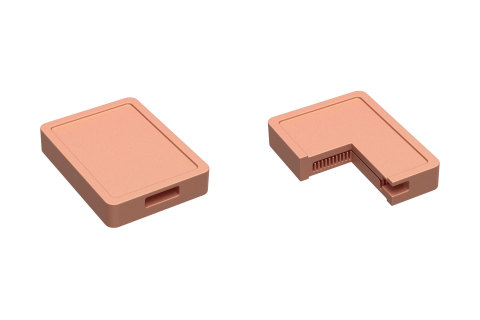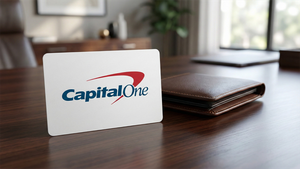Production System Binder Jetting Technology Enables the Mass Production of High-Performance Copper Parts for Automotive, Aerospace, and Electronics
Desktop Metal (NYSE: DM) today announced it has qualified commercially pure copper (> 99.95% purity) for additive manufacturing on the Production System™ platform, which leverages patent pending Single Pass Jetting™ (SPJ) technology designed to achieve the fastest build speeds in the metal additive manufacturing industry. Customers can now leverage SPJ technology for the production of high-performance copper parts at scale across a broad variety of industries, including automotive, aerospace, and electronics.
This press release features multimedia. View the full release here: https://www.businesswire.com/news/home/20211222005261/en/

Liquid cooling plates are used to regulate temperature on high-performance microprocessors. Coolant flows through the fins, which provide a large surface area to transfer heat from the passing fluid to the heat sink in order to cool the chip that is attached to the outer body. These cooling geometries (visible in the cutaway view of the part) typically require capital-intensive, long lead time, and skilled labor-intensive production processes. Whereas conventional production methods for this liquid cooling plate required machining and assembling multiple separate components due to restrictions on tool access, binder jetting on the Production System can produce the part as a single component, reducing manufacturing and operational complexity, part cost, and lead time. (Photo: Business Wire)
With its excellent thermal and electrical conductivity, commercially pure copper is an ideal material for applications requiring heat or electricity transfer, such as cold plates, pucks and manifolds, heat sinks, heat exchangers, and bus bars used in power-intensive electrical applications. It is the third-most-consumed industrial metal in the world.
“Copper has been a highly requested material from many of our customers and prospects, and has applications spanning a broad variety of industries, from thermal hardware found in air and liquid cooling systems to conformally cooled coils for transmission of high frequency currents,” said Jonah Myerberg, co-founder and CTO of Desktop Metal. “We are excited to be able to expand our extensive Production System materials portfolio to support customers looking to 3D print electrically and thermally conductive components at scale and at a fraction of the cost of conventional manufacturing methods.”
Desktop Metal’s materials science team has qualified and fully characterized commercially pure copper (C10300) printed on Production System technology with greater than 99.95 percent purity, enabling excellent thermal and electrical conductivity. Manufacturers can now print copper parts on the Production System with significant geometric complexity in a single step instead of brazing multiple conventionally produced copper components together, eliminating a time-intensive and expensive process prone to error and waste. With the geometric freedom enabled by binder jetting, engineers can also explore new, high-performance designs not possible with conventional manufacturing methods, such as the lattice structures and conformal cooling channels to improve heat transfer.
An example of a key application includes:
-
Liquid Cooling Plate
Liquid cooling plates are used to regulate temperature on high-performance microprocessors. Coolant flows through the fins, which provide a large surface area to transfer heat from the passing fluid to the heat sink in order to cool the chip that is attached to the outer body. These cooling geometries typically require capital-intensive, long lead time, and skilled labor-intensive production processes, such as skiving and machining, given the challenges associated with achieving precision and repeatability in such a small form factor. In addition these commonly used conventional manufacturing processes are subtractive and produce excess scrap material, greatly increasing the associated part costs.
Whereas conventional production methods for this liquid cooling plate required machining and assembling multiple separate components due to restrictions on tool access, binder jetting on the Production System can produce the part as a single component, reducing manufacturing and operational complexity, part cost, and lead time. The Production System unlocks the capacity to print hundreds of cooling plates per day, enabling cost-effective volume production. Copper is the ideal material for heat exchangers due to its excellent conductivity, maximizing heat dissipation from the electronic chip to the cooling fluid.
The Production System - World’s Fastest Way to 3D Print Metal Parts At-Scale
Created by the inventors of binder jetting and single-pass inkjet technology, the Production System is an industrial manufacturing platform powered by Desktop Metal’s SPJ technology. It is designed to achieve speeds up to 100 times those of legacy powder bed fusion additive manufacturing technologies and enable production quantities of up to millions of parts per year at costs competitive with conventional mass production techniques.
The Production System platform consists of two printer models: the P-1, a solution for process development and serial production applications, and the P-50, a large form factor mass production solution for end-use parts. The Production System combines Desktop Metal engineered binders with an open material platform, allowing customers to produce high-performance parts using the same low-cost metal powders used in the Metal Injection Molding (MIM) industry. An inert processing environment enables compatibility with a variety of materials, including high-performance alloys and even reactive metals, such as aluminum and titanium. To learn more about the Production System, visit: www.desktopmetal.com/products/production.
In addition to copper, the materials library for the Production System platform has expanded to include D2 tool steel, 420 stainless steel, nickel alloy IN625, 4140 low-alloy steel, 316L stainless steel, and 17-4PH stainless steel, each of which have been qualified by Desktop Metal. The platform also supports several customer-qualified materials, including silver and gold, and Desktop Metal plans to add additional metals to its portfolio, including tool steels, stainless steels, superalloys, and more.
To learn more about copper and the Production System materials portfolio, visit: www.desktopmetal.com/materials.
About Desktop Metal
Desktop Metal, Inc., based in Burlington, Massachusetts, is accelerating the transformation of manufacturing with an expansive portfolio of 3D printing solutions, from rapid prototyping to mass production. Founded in 2015 by leaders in advanced manufacturing, metallurgy, and robotics, the company is addressing the unmet challenges of speed, cost, and quality to make additive manufacturing an essential tool for engineers and manufacturers around the world. Desktop Metal was selected as one of the world’s 30 most promising Technology Pioneers by the World Economic Forum, named to MIT Technology Review’s list of 50 Smartest Companies, and the 2021 winner of Fast Company’s Innovation by Design Award in materials and Fast Company’s Next Big Things in Tech Award for sustainability. For more information, visit www.desktopmetal.com.
Forward-looking Statements
This press release contains certain forward-looking statements within the meaning of the federal securities laws. Forward-looking statements generally are identified by the words “believe,” “project,” “expect,” “anticipate,” “estimate,” “intend,” “strategy,” “future,” “opportunity,” “plan,” “may,” “should,” “will,” “would,” “will be,” “will continue,” “will likely result,” and similar expressions. Forward-looking statements are predictions, projections and other statements about future events that are based on current expectations and assumptions and, as a result, are subject to risks, uncertainties. Many factors could cause actual future events to differ materially from the forward-looking statements in this document, including but not limited to, the risks and uncertainties set forth in Desktop Metal, Inc.'s filings with the U.S. Securities and Exchange Commission. These filings identify and address other important risks and uncertainties that could cause actual events and results to differ materially from those contained in the forward-looking statements. Forward-looking statements speak only as of the date they are made. Readers are cautioned not to put undue reliance on forward-looking statements, and Desktop Metal, Inc. assumes no obligation and does not intend to update or revise these forward-looking statements, whether as a result of new information, future events, or otherwise.
View source version on businesswire.com: https://www.businesswire.com/news/home/20211222005261/en/
Contacts
Media Relations:
Caroline Legg
carolinelegg@desktopmetal.com
(203) 313-4228
Investor Relations:
Jay Gentzkow
jaygentzkow@desktopmetal.com
(781) 730-2110





